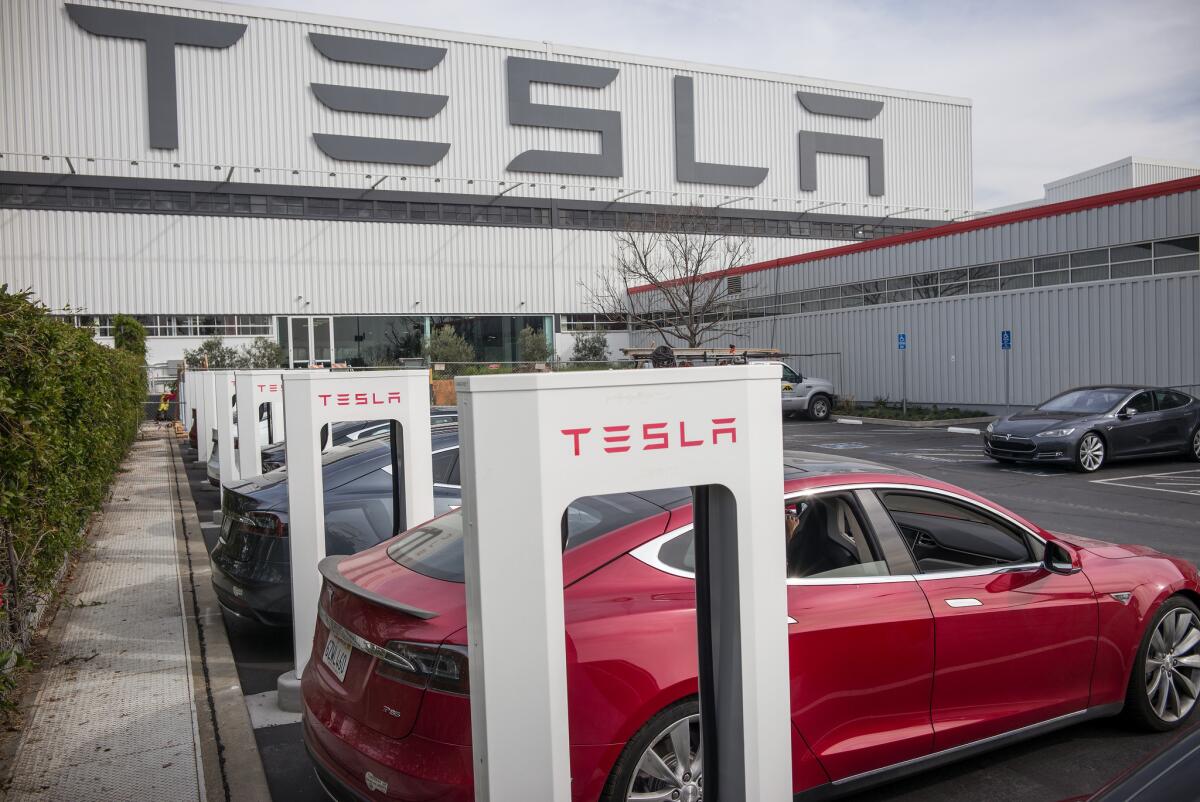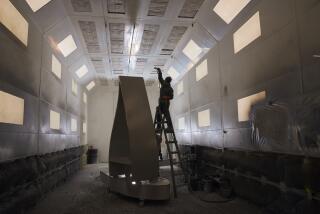More than 100,000 clean-energy workers lost their jobs in March
Nate Otto is selling fewer rooftop solar systems these days.
Business is down about 50% from a record-setting first quarter for Otto’s Palm Springs-based solar installer, Hot Purple Energy. But he hasn’t fired any of his 48 employees, or cut their salaries. He’s been giving them odd jobs — cleaning trucks, adding security lights — even as he limits the number of people at job sites and takes steps to keep them as far away from each other as possible.
“I’ve done everything I can just to keep the guys busy,” he said.
Otto’s employees are some of the lucky ones.
A report out Wednesday from Environmental Entrepreneurs, a clean energy advocacy group, finds that more than 106,000 clean energy workers filed for unemployment benefits in March — a number that has almost certainly grown over the last few weeks.
Consultants at BW Research who analyzed the numbers also project that the clean energy sector will shed more than 500,000 jobs — or 15% of its workforce — in the months ahead “if no additional actions are taken to support the industries.”
Two-thirds of the people who have lost their jobs so far work in energy efficiency, which includes heating and air conditioning and the installation of efficient lighting and appliances — work that often involves going into people’s homes. Renewable electricity, which includes wind and solar power, was the next most-affected sector, followed by the production of electric and hybrid cars.
California was the hardest-hit state, with 20,000 clean energy workers filing for unemployment in March.
The report from Environmental Entrepreneurs, known as E2, also offered reasons for hope.
The U.S. clean energy sector employed nearly 3.4 million people before the COVID-19 pandemic — three times the workforce of the fossil fuel industry, according to E2. And those numbers were growing quickly. The Bureau of Labor Statistics projected last year that the two fastest-growing jobs in America over the next decade would be solar panel installer and wind turbine technician.
Your support helps us deliver the news that matters most. Subscribe to the Los Angeles Times.
Advocates say Congress has a significant opportunity to jump-start the economy by supporting clean energy technologies.
“What these numbers tell us is that clean energy workers are a huge and important part of America’s workforce — and they are hurting badly,” E2 Executive Director Bob Keefe said in a statement. “Lawmakers simply cannot ignore the millions of electricians, technicians and factory workers who work in clean energy as they consider ongoing economic recovery efforts.”
Keefe pointed to the American Recovery and Reinvestment Act — which pumped $90 billion into solar power, home weatherization and other low-emission technologies during the Great Recession — as evidence that “clean energy can lead the way to recovery.”
Others focused on reducing air pollution and planet-warming emissions are promoting the same idea.
The Breakthrough Institute, an environmental research group based in Oakland, released a report on Tuesday outlining what it described as more than $500 billion in potential federal investments that could be used to fight climate change, all of it proposed in previously introduced bills with bipartisan support. The bills would support solutions such as removing carbon from the atmosphere, large-scale energy storage, tax credits for renewable power developers and electric vehicle charging stations.
Congress approved $90 billion for clean energy during the Great Recession, providing a model for how lawmakers might boost the economy amid COVID-19.
The Breakthrough Institute is making those recommendations with an eye toward next year, knowing that major investments in clean energy are unlikely with President Trump in the White House, according to the group’s deputy director, Alex Trembath.
“No matter how much stimulus there is in 2020, I think the Biden administration — knock on wood that it exists — will want to do some of their own,” he said.

The nonprofit Los Angeles Cleantech Incubator is preparing its own stimulus proposal focused on zero-emission transportation.
The government-funded nonprofit, which works to help start-ups get off the ground, has been talking ideas with clean technology businesses and congressional staffers, said Matt Petersen, the incubator’s president. He said they’re finalizing a proposal that includes incentives to get more electric vehicles on the road, funding for workforce training and support for innovative start-ups.
Cleaning up heavy-duty transportation is especially important for Southern California, Petersen said, because nearly 40% of the goods that come into the United States in cargo containers moves through the ports of Los Angeles and Long Beach, which remain overwhelmingly powered by diesel-fueled trucks, ships, locomotives and cargo-handling equipment.
The ports are the region’s largest source of pollution.
“We’re all loving this clean air right now,” Petersen said, referring to the noticeable drop in air pollution that has been caused by the COVID-19 pandemic shutting down much of the nation’s economy. “We want this same air quality when the world arrives for the Olympics in 2028. Not just for the visitors, but for the people who live along our freeways and our goods movement corridors.”
We asked eight experts if the global mobilization to slow the pandemic might pave the way for climate action.
In Palm Springs, Otto knows the economic situation is going to get worse before it gets better.
Even though his crews have continued to install solar panels on people’s homes, some customers have delayed jobs. And the sales slowdown will lead to fewer installations later, at least for a time — and Otto doesn’t get paid until panels are installed.
“We’re going to incur losses,” he said. “There’s no doubt about that.”








